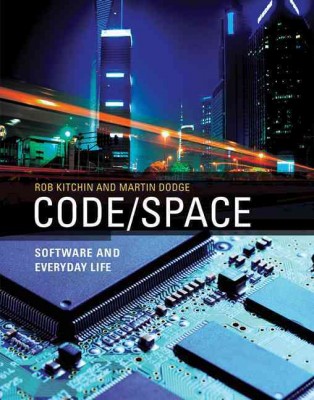| Code/Space: Software and Everyday Life Contributor(s): Kitchin, Rob (Author), Dodge, Martin (Author) |
|
 |
ISBN: 0262525917 ISBN-13: 9780262525916 Publisher: MIT Press OUR PRICE: $39.60 Product Type: Paperback - Other Formats Published: January 2014 |
| Additional Information |
| BISAC Categories: - Computers | Social Aspects - Computers | Software Development & Engineering - General - Computers | Human-computer Interaction (hci) |
| Dewey: 303.483 |
| Series: Software Studies (Mit Press) |
| Physical Information: 0.56" H x 6.67" W x 8.96" (0.99 lbs) 304 pages |
| Descriptions, Reviews, Etc. |
| Publisher Description: An analysis of the ways that software creates new spatialities in everyday life, from supermarket checkout lines to airline flight paths. After little more than half a century since its initial development, computer code is extensively and intimately woven into the fabric of our everyday lives. From the digital alarm clock that wakes us to the air traffic control system that guides our plane in for a landing, software is shaping our world: it creates new ways of undertaking tasks, speeds up and automates existing practices, transforms social and economic relations, and offers new forms of cultural activity, personal empowerment, and modes of play. In Code/Space, Rob Kitchin and Martin Dodge examine software from a spatial perspective, analyzing the dyadic relationship of software and space. The production of space, they argue, is increasingly dependent on code, and code is written to produce space. Examples of code/space include airport check-in areas, networked offices, and caf s that are transformed into workspaces by laptops and wireless access. Kitchin and Dodge argue that software, through its ability to do work in the world, transduces space. Then Kitchin and Dodge develop a set of conceptual tools for identifying and understanding the interrelationship of software, space, and everyday life, and illustrate their arguments with rich empirical material. And, finally, they issue a manifesto, calling for critical scholarship into the production and workings of code rather than simply the technologies it enables--a new kind of social science focused on explaining the social, economic, and spatial contours of software. |
Contributor Bio(s): Kitchin, Rob: - Rob Kitchin is Professor of Human Geography and Director of the National Institute of Regional and Spatial Analysis at the National University of Maynooth, Ireland.Dodge, Martin: - Martin Dodge is Senior Lecturer in Human Geography at the University of Manchester's School of Environment and Development.Fuller, Matthew: - Matthew Fuller is Professor of Cultural Studies at the Digital Culture Unit, Centre for Cultural Studies, Goldsmiths, University of London. He is the author of Media Ecologies: Materialist Energies in Art and Technoculture (MIT Press), Software Studies (MIT Press), and, with Andrew Goffey, of Evil Media (MIT Press) as well as Behind the Blip: Essays on the Culture of Software and other books.Manovich, Lev: - Lev Manovich is Professor of Visual Arts, University of California, San Diego. His book The Language of New Media (MIT Press, 2001) has been hailed as "the most suggestive and broad ranging media history since Marshall McLuhan."Wardrip-Fruin, Noah: - Noah Wardrip-Fruin is Professor in the Department of Computer Science at the University of California, Santa Cruz. He is the coeditor of four collections published by the MIT Press: with Nick Montfort, The New Media Reader (2003); with Pat Harrigan, First Person: New Media as Story, Performance, and Game (2004), Second Person: Role-Playing and Story in Games and Playable Media (2007), and Third Person: Authoring and Exploring Vast Narratives (2009). |